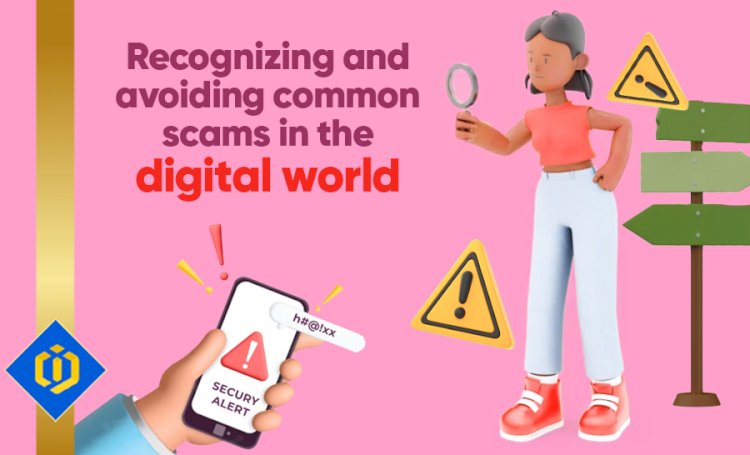How to Avoid Most Prevalent Scams and Frauds in the Crypto World

Important cryptocurrency frauds include.
New scams appear as the cryptocurrency industry develops. Keep an eye out for and be aware of these common scams.
1. Ponzi schemes are frauds that entice investors with high returns but pay out earlier investors with money from new investors.
2. Initial Coin Offerings (ICOs) that are fake: These are dishonest schemes to raise money that make tall promises but in the end are a fraud.
3. Phishing scams are used to trick people into disclosing their private keys or seed phrases by pretending to be trusted exchanges or wallet services.
4. Pyramid Schemes: These frauds enlist new members to increase their profits, much like Ponzi schemes.
5. Pump and Dump Scams: When buyers and sellers work together to artificially inflate cryptocurrency prices, the price falls for those who purchased at the inflated level.
Use caution, do your research on the project and the team, and store private keys securely to protect yourself.
Tinder Scam:.
The well-known dating app Tinder may serve as a venue for fraud.
1. Fraudsters pose as someone else and create fake profiles to lure victims into sending cash or personal information.
2. Romance scams involve con artists developing a rapport with their target before requesting money and frequently making excuses about their predicament.
3. Prostitution and sex trafficking: Some people may use Tinder to find customers for prostitution or to participate in sex trafficking.
4. Phishing Scams: Fraudsters impersonate a legitimate company in order to trick victims into disclosing personal information or payment information.
Be wary, create strong, one-of-a-kind passwords, enable two-factor authentication, and report any suspected fraud to prevent Tinder scams.
Bitcoin scams on Tinder
Similar to phishing scams, Tinder scammers may request users send cryptocurrency to a phony platform.
Be cautious when using Tinder or any other online platform, research platforms and wallets, and only use reputable services to prevent such scams.
Local financial frauds include.
Local financial fraudsters use a variety of deceptive schemes, such as investment fraud, Ponzi schemes, phishing fraud, loan fraud, and charity fraud, to defraud people in particular geographic areas.
Exercise caution and due diligence when considering financial opportunities, research the business or person providing the opportunity, and avoid providing personal information or payment details unless you are certain that the request is legitimate.
It's still possible to be duped if a local financial manager collects money from people and transfers the remaining funds to a scammer using cryptocurrency. Investigate investment opportunities, work with trustworthy financial managers or advisors, and keep a close eye on your accounts to prevent this.
Secure your accounts and personal information if you believe you are a victim of a financial scam and report it to the appropriate authorities. If necessary, consult a financial or legal professional for advice.
Local financial managers who unintentionally assist in the transfer of funds to a fraudulent party risk legal repercussions. The victim of a scam should immediately notify the police and financial authorities, secure their accounts and personal information, and keep a close eye on their finances. In addition to protecting themselves, the financial manager should seek legal advice and take the necessary precautions.
Social media fraud:.
Platforms for social media use can facilitate scams. Watch out for these typical con artists.
1. Fake Giveaways: Scammers create fake accounts that impersonate celebrities or influencers and announce that they are holding a giveaway. Typically, in order to participate, contestants must send cryptocurrency or personal information.
2. Fraudsters may pose as people or companies in order to win over their trust and coerce their victims into sending money or disclosing personal information.
3. Scammers advertise phony investment opportunities with high returns only to vanish with the invested money in an investment scam.
Verify the legitimacy of accounts, be wary of opportunities that seem too good to be true, and never share personal information or payment information with unauthorized sources if you want to avoid social media scams.
Email Scams:.
Email scams are still common and come in many different forms:.
1. Phishing emails: Fraudsters pretend to be reputable companies in order to obtain personal information or payment information.
2. Scammers posing as wealthy Nigerian princes ask for help transferring money and promise a reward if you assist them in exchange. Your account is emptied as soon as your bank details are given.
3. Scams involving job offers: Fraudsters send emails promising high-paying positions that require little effort, but frequently demand an upfront payment or personal information.
Never click on dubious links or attachments in emails from unknown senders, exercise caution when opening emails from unfamiliar senders, and double-check the validity of any offers or information requests.
Scams related to online shopping:.
Unwary shoppers are taken advantage of by online shopping scams:.
1. Products that are Counterfeit: Scammers offer low-cost, counterfeit goods that are frequently of poor quality or never arrive.
2. Online shops that don't exist: Scammers set up phony online shops that take credit card payments and personal information without actually sending any goods.
3. Overpayment Scams: Scammers overpay for an item and request a refund from the seller, only to have the initial payment canceled or revealed to be fraudulent.
Shop only from reputable websites, read reviews, check seller ratings, use secure payment methods, and be wary of offers that seem too good to be true if you want to avoid online shopping scams.
You can guard yourself against falling for scams in the online world by staying informed and on guard. Never give out personal information or payment information to sources that are not reputable. Always be cautious. Research any opportunity. Report a scam to the appropriate authorities and take the necessary precautions to secure your accounts and personal data if you have any suspicions about it.
The various scams that can be encountered online are highlighted in this article. Ponzi schemes, phony ICOs, phishing scams, pyramid schemes, and pump-and-dump schemes are a few of the well-known cryptocurrency scams. It's critical to use caution and fully investigate any investment opportunities in order to protect oneself.
Another issue is Tinder fraud, which includes catfishing, romance fraud, prostitution and sex trafficking, and phishing schemes. Users should never send money or personal information to someone they haven't met in person in order to stay safe on the platform, and they should report any suspicious activity.
Swindlers con their victims into sending money to phony platforms or wallets when they use cryptocurrency on Tinder. When using online platforms, exercise extreme caution and only use reputable services.
Local financial frauds, such as phishing schemes, loan frauds, investment frauds, and Ponzi schemes, prey on people in particular geographic regions. By checking out any financial opportunity's legitimacy and exercising caution when disclosing personal information, you can avoid becoming a victim.
A local financial manager could face legal repercussions if they unknowingly assist in fraud. Victims should report incidents to the police and financial authorities, and everyone involved should secure their personal information and accounts.
In conclusion, it is important to be vigilant, do your research, and exercise caution when interacting with strangers or potential business partners online. Protect your personal information and accounts at all times, and report any suspicious activity.
Author: Pooyan Ghamari, Swiss Economist

 content-team
content-team 


















